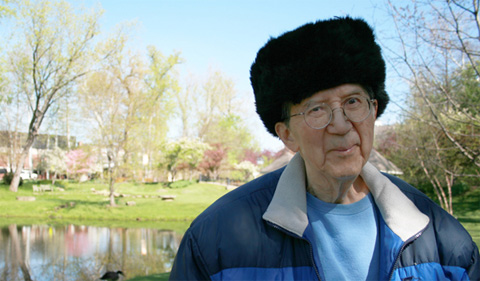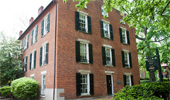Dr. James Y. Tong, Professor Emeritus of Chemistry & Biochemistry at Ohio University, born in Shanghai, China on Dec. 8, 1926, passed away on Sept. 24, 2019, in Athens, Ohio.
“A life-long educator and an early advocate for women in the sciences, Jimmy mentored students across all disciplines and was well known for his love of chemistry and its practical applications, such as photography, toxicology, and in particular, forensics,” according to his obituary.
Tong joined Ohio University as an assistant professor in 1957. He was promoted to Associate Professor in 1964 and Professor in 1969. He retired in 1997. He earned a Ph.D. in Chemistry from the University of Wisconsin.
Tong created the FEPAC-accredited B.S. Forensic Chemistry degree in 1976, and it is one of the longest-standing programs of its kind in the country, possibly the oldest, and it has a strong core of dedicated and experienced faculty. Typically, about 50-80 forensic chemistry majors are enrolled in the program at any time, and the program has more than 300 forensic chemistry graduates in its 40-year history. The department offers the James Y. and Harriet Tong Forensic Chemistry Scholarship for students showing aptitude as forensic chemists.
Writing to introduce himself to Andrew Tangonan, Assistant Professor of Instruction & NMR Manager, in 2013, Tong wrote, “I have retired from the department in 1997 but am still here doing outreach programs for the department. I don’t know how to classify myself. When I first came in 1957, the department treated me as a physical chemistry because of the graduate courses I would like to teach: Thermodynamics, Chemical Kinetics, and Solutions. To complicate things, I got a grant to start a teaching lab for Radiochemistry (I also taught the then new Radiochemistry lecture course) while Physics got a grant to start a Nuclear Physics Lab. A Physics professor and I started the first radiation safety committee. The Physicist was its first chairman and I took over the chairship after he quit. I hired the first Radiation Safety officer and obtained a general license for Radioactive Material from AEC so that anyone who wants to obtain radioactive material can apply from our Radiation Safety Committee instead of from AEC. The Radiation Safety Officer didn’t have enough to do before Physics Department obtained their tandem Van de Graff accelerator. He calibrated all the X-ray machine in Athens hospitals and branched to other devices that may produce harmful radiations such microwave ovens and certain electronic tubes that emits harmful radiation. I was involved in the development of the M.S. in environmental science and the B.S. in environmental science degrees in various departments. I taught the first toxicology course from 1976 to about 1994 in a chemistry department. In 1976 I started and directed the first B.S. in Forensic Chemistry program till I retired in 1997.”
“It wasn’t easy finding his office, but we had a good chat the following day,” remembers Tangonan after receiving Tong’s email. “He made me feel at home in the department. They don’t make many like him anymore.”
A Passion for Forensic Chemistry
Tong shared his passion for forensic chemistry widely. He also began the annual OHIO Chemistry Contest Day in the early 1970s, where high school students come to Ohio University to compete for scholarships.
“Jimmy was the person to get me interested in forensic and environmental chemistry,” said Dr. Peter de B. Harrington. “He was always, very generous with his end of the year Forensic Dinner at the Chinese restaurant, Lam’s Garden.”
“I honestly do not know how to put into words how incredibly lucky I have been to have 28 years of Dr. Tong’s mentoring and friendship,” said Dr. Rebecca Barlag, current director of the forensics program that Tong started. “He was a true educator who cared about every aspect of his students’ lives. He taught me how to have faith in myself and to be humble. His advice, support, encouragement, and love will be missed terribly, but will remain in my heart.”
“He was a very generous soul, and he invested a lot of his time and money in the undergraduates at OHIO. In these respects, he is/was a marvelous role model,” said Dr. Glen Jackson, an Ohio University alum who directed the OHIO forensic chemistry program until departing for West Virginia University, where he is now the Ming Hsieh Distinguished Professor in Forensic and Investigative Science.
Dr. Jixin Chen noted that while Tong had retired by the Chen arrived, “He cared about the young faculty. He has helped me settle down in Athens, and we had a few dinners together when I arrived. He makes my heart warm, and I feel that I am welcomed. I am also blessed to join a nice environment and culture that he and the other senior members have created over the years. He cared about the students and the department after his retirement. I believe the whole department appreciates him in providing volunteer service to the department in organizing student events, let alone the whole forensic program he has started in the 70s. I will always remember Dr. Tong.”
Dedicated to Opportunities for Women in Sciences
And more than four decades ago, Tong set out to change the fact that there were few women students and faculty in science and engineering fields.
“In an era when most young women were not encouraged by their teachers, parents or the profession to pursue science and engineering careers, Tong began a 40-year effort to balance the number of women and men professionals. He created the Women In Science and Engineering (WISE) program, an annual event at Ohio University where female sixth grade, middle and high school students from around the region are invited to visit campus to experience and learn about fields as varied as forensic chemistry to clinical psychology. WISE participants spend the day attending demonstrations and talks by female faculty members and outstanding students about career opportunities in science and engineering,” writes Jean Andrews in a 2015 story headlined “Jimmy Tong: Four Decades of WISE Guidance.”
“Nicole Cavender was in high school in Athens County when she attended WISE events and the Southeast (Ohio) District Science Fair in the early 1990s. She recalls how Tong encouraged her to persist in her science interests as she pursued undergraduate studies in environmental and plant biology at Ohio University. With continued resolve, she kept at her academic pursuits and in 2001 received a Ph.D. in Horticulture and Crop Science from the Ohio State University. She now serves as the vice president of science and conservation at The Morton Arboretum,” Andrews wrote.
“Cavender learned some valuable lessons from Tong and other mentors about how to focus on success. “If you are passionate about math and science,” Cavender notes, “then you are on your way to a successful career. Don’t give it up. Passion is not something that can be taught very easily and it is often an essential ingredient to being successful.”
Andrews also interviewed Tong about the program: “I saw a prejudice against young women who wanted to study science and technology. And 40 years later women are in school, yet nobody is telling them they can go into engineering if they want,” he says. “(Secondary education) teachers are overworked and can’t talk about careers; teachers are underpaid and have no time for outside events. WISE provides that bridge to making informed decisions about what is possible in a young woman’s life.”
A memorial service will be announced later this year. Arrangements are entrusted to Hughes-Moquin Funeral Home.




















4 Comments